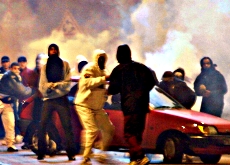“No risk” of riots spreading to Switzerland

Rioting in France's depressed suburbs and cities has spread close to the Swiss border, but local authorities do not expect the unrest to reach Switzerland.
Observers say the outbreak of violence in France has much to do with socio-economic factors that do not exist in Swiss neighbourhoods.
For nearly two weeks rioting has been spreading across France. Violence broke out after two youngsters were electrocuted while allegedly fleeing police officers.
Since then, police have been fighting rioters night after night, thousands of cars have been burnt and even firefighters and ambulance services have faced attacks.
The French cabinet on Tuesday gave permission to local authorities to impose curfews in areas badly affected by the violence.
Swiss security
The unrest, which began near Paris, has spread to areas near Geneva and Basel. But police in the two cities have been keeping a close eye on events in France, and say that the violence will not cross the border.
“There is no risk that we will see this kind of violence here,” said Klaus Mannhart, spokesman for the Basel police, who reckons these events are specific to France.
Police in Geneva, perhaps the most French of Swiss cities, say they have not seen anything that might lead them to take special measures.
Specialists point out that the chances that similar events would take place in Switzerland are slim. “Social differences aren’t as great here as they are in France,” Jürg Frey, head of integration promotion in Zurich, told Bern’s Bund newspaper.
Sandro Cattacin, a sociologist at Geneva University, agrees. “In Switzerland, the risk is low,” he told swissinfo. “We don’t have any ghettos and we have a long tradition of integrating foreigners.”
For Cattacin, if some areas near Geneva have seen rioting, it is nothing more than copycat violence. “France’s Rhone-Alpes region has a lower unemployment rate than the national average,” he said.
Integration
The lack of job prospects is blamed for fuelling much of the French violence, carried out in many cases by youngsters with foreign origins.
The neighbourhoods where they live often lack decent services and are considered by police to be no-go zones.
However, some of the social problems found in France are also seen in Swiss cities. Although there appears to be little risk of outbreaks of violence, experts say the authorities still need to keep a close eye on some residential areas.
“We have to ask ourselves every day what we can do to avoid problems like those faced by the French,” Gerda Hauck, responsible for integration matters in Bern, told the Bund newspaper.
Since 1998 Basel city’s authorities have tried to avoid the emergence of ghettos with what they call a more aggressive integration policy. The city has tried to ensure that neighbourhoods have a good social mix.
Youngsters feel there is little risk of violence breaking out.
“We are well-behaved, we go to school, our parents have a job and all is going well,” one Geneva youth told Le Matin Dimanche newspaper. “Over there, they don’t have anything – no job, no future – so they want to wreck everything.”
Social workers
Cattacin warns though that even if the risk is low, the authorities have still to take a more active role, at least in Geneva.
“Our local authorities, like the French ones, often fail to listen to the needs of their citizens, which is not the case in other Swiss towns,” he said.
He explained that youngsters in Switzerland are insecure about their job prospects and local governments have almost no say in how the economy is run nowadays.
“It’s not just that there are the haves and have-nots,” he added. “The fact is that these youngsters cannot see what the future holds for them and this can only lead to violence eventually.”
Cattacin reckons that more money needs to go to social workers in touch with today’s youth – an opinion shared by Hauck.
“Prevention is very important,” she said. “Repairing something always costs more than preventive measures.”
swissinfo
Rioting broke out in the Paris area on October 27 and has spread to other parts of France since Friday.
Each night, hundreds of cars have been torched and buses attacked. So far, around 5,000 vehicles have been set on fire.
On Monday, the rioting claimed its first victim, a 60-year-old man who was attacked on the outskirts of Paris and spent two days in a coma.

In compliance with the JTI standards
More: SWI swissinfo.ch certified by the Journalism Trust Initiative


You can find an overview of ongoing debates with our journalists here. Please join us!
If you want to start a conversation about a topic raised in this article or want to report factual errors, email us at english@swissinfo.ch.